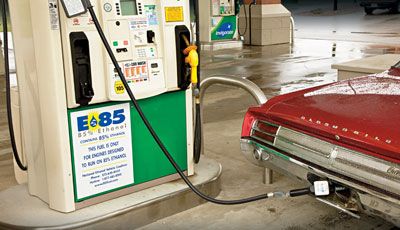
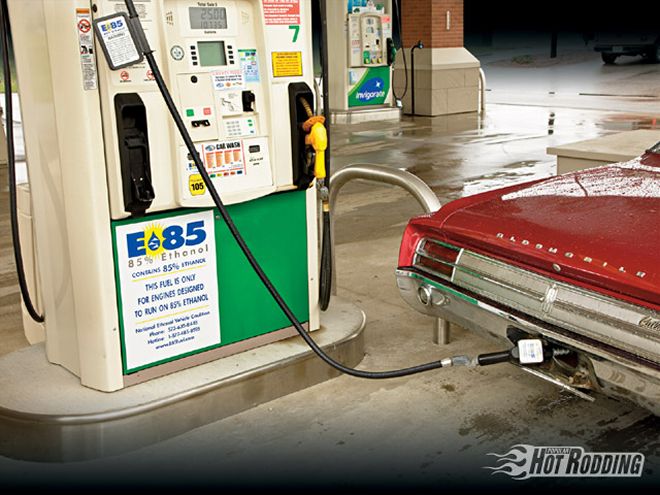
E85 is a blend of 85 percent Ethanol, a grain-alcohol made from corn, and 15 percent gasoline. This mixture gives the fuel a much higher octane rating than gasoline, and is cheaper than pump gas, race gas, or methanol.
For max power, the air/fuel mixture for E85 is ideally about 30 percent richer than for gasoline alone. (For the sake of reference, an idea stoichiometric air/fuel ratio for gasoline is 14.7:1, but only 9.765:1 for E85.) Fuel economy suffers about the same percent. The fuel-heavy mix has a cooling effect, allowing for more timing and compression. The addition of alcohol to gasoline in such a high percent gives us a significantly higher octane rating, which is posted as 105 at the pump. At about $2 a gallon on average, which is about the cheapest octane in the country, even after you account for the lower fuel economy. This octane level can easily support compression ratios up to about 14:1. Experimentation is bringing that number even higher. With this increase of compression tolerance, many engine improvements can be made.
When you're building an engine with the intention of running on corn, your higher compression ratio limit gives E85 other advantages, but you have to take advantage of these in order to gain the full benefit of the conversion. High-compression engines by nature produce a lot of low-rpm power. This gives room for about 15 degrees longer seat-to-seat camshaft duration without hurting the low-rpm power, while increasing the high side. Lower-compression engines, 10.5:1 for example, produce most of their power at the end of the power stroke, while high-compression engines get their power from the beginning. It lets us open the exhaust valve sooner, in turn allowing us to have a smaller exhaust valve. The smaller exhaust valve can then make room for a larger intake valve. The heavy air/fuel ratio of the alcohol mix can really benefit from this change. Of course, if you've already purchased your heads and aren't looking to spend a ton of money re-machining them, you can still get some of the benefit with a camshaft swap.
A downside to E85 is that it's very dry. You may have noticed how rubbing alcohol leaves your skin white and dry. This fuel craves moisture the same way. It pulls water from the atmosphere and carries it into the fuel system. Water isn't necessarily a detriment to power, but it can cause premature failure of fuel system components along the way. Water accelerates oxidation, and can destroy fuel lines, pumps, and filters from the inside. We will talk about what makes a product alcohol-compliant later on in the story.
Another one of E85's downfalls is that the government doesn't control its content very closely. The assumed 85 percent ethanol is no guarantee of its actual content. Winter blends of the fuel can be as low as 70 percent to accommodate cold-starting conditions. Big Brother says the mixture has to be between 70 and 90 percent. With a late-model, fuel-injected car built to accept E85, the difference isn't noticeable, however, when a carburetor is subjected to this variance, it can't compensate. In order for the gas companies to avoid paying a liquor tax, they denature the alcohol. This 2 percent of poison added to achieve the denaturing element is only hoped to burn, not formulated to complement the alcohol. People in the racing fuel industry refer to this poison as "refinery drippings."
Aside from the changes in the mixture ratio, the gasoline side of the equation is hardly monitored at all. As with the blend percent, gasoline changes seasonally, and there are no minimum octane level requirements. Unlike gasoline, E85 is not required to have any additives to protect your engine or improve its burn.
E85 has some great performance benefits and a lot of potential. Since the pump blend is formulated to be used on computer-controlled "Flex-Fuel" vehicles, there is a lot of room for variances in the fuel's composition that carburetors can't account for on the fly. In the vast majority of cases, the mixture ranges in a narrow band from 83-87 percent, but there is no hard guarantee. With an easy-to-use tester, or a reliable fuel supplier, this problem can be avoided. With the price of around $2 a gallon, E85's tolerance to high compression and advanced timing can't be beat for the money.
Gas versus E85 Metering Here’s a basic comparison on what the metering changes are from gasoline to E85 in a 750-cfm carburetor. Specifications courtesy of Barry Grant. PART: GAS: E85: Main jets 76/83 85/93 Idle air bleeds 70 63 High-speed air bleed 39 29 Booster legs 160 169 Squirter 31 35 Needle/seat 110 130 Idle feed restrictor 39 36Where Can I Get E85?
The biggest hurdle in a beneficial conversion is access to the fuel. In California and other western states, the juice is nearly impossible to find. On the other hand, states like Minnesota have it off every freeway exit. Check the map showing the concentration of pumps in the Midwest, and the absence everywhere else. The price for E85 has been consistently reported to be slightly less than the lowest grade gasoline available, putting the average around $2 a gallon. There are over 2,000 E85 retail filling stations out there, and the numbers are growing, but not as fast as we'd like. In order, Minnesota, Illinois, and Wisconsin have the highest number of E85 stations. If you don't live in the grain-belt, you will have to travel to get the fuel, and until it becomes more readily available, you may hold off on the conversion for a street car.
In a race application, you aren't bound by the convenience factor, since most race cars don't have to travel very far under their own power. This is where Rockett Brand Racing Fuels comes in. They produce an E85 fuel that is guaranteed to be 85 percent ethanol, unlike the pump stuff. This consistency is very important to drag racers who need their cars to run consistently. Rockett has the same government requirement to de-nature the alcohol used in the fuel, but they use a special additive that actually burns well. Instead of throwing whatever gasoline they can find into the mix, they've created a special blend of chemicals used for building race gas to work optimally with the ethanol. Rockett knows the fuel needs additives that the government doesn't require. Alcohol has poor lubrication properties, so they've added lubricants in addition to corrosion inhibitors. This special attention to the fuel's contents gives it a 112-octane rating, far more than the government's estimated 105-octane pump E85. To find out what E85 fueling stations might be near you, log onto the National Ethanol Vehicle Coalitions' website: www.e85refueling.com.
"There are over 2,000 E85 retail filling stations out there, and the numbers are growing..."
E85 Carburetors
Since the air/fuel ratio for E85 is much lower than for gasoline, the carburetor has to be specifically calibrated for it. Carburetor manufacturers have put a lot of R&D into their E85 carburetors to run this new fuel. Many have built carbs for methanol racing fuel for some time now, and their internal passages are significantly larger than those of a gasoline carb. Since the volume of fuel needed for alcohol applications is higher, the metering system has to be dead-on in order for it to run correctly. Simply modifying a gasoline- or methanol-style carburetor with jet and air bleed changes isn't enough for the conversion. Since alcohol has a tendency to pick up water from the atmosphere, the gaskets and other sealing materials can't be sensitive to oxidation. PHR contributor, David Vizard, has done quite a bit of experimenting with E85. He has found that doing only a carburetor swap to convert to E85 on a 10.5:1 engine yielded a 6hp gain. In this case that was a 2 percent change. While changing the carburetor by itself doesn't give a huge power boost, it is the first and most crucial change to make.
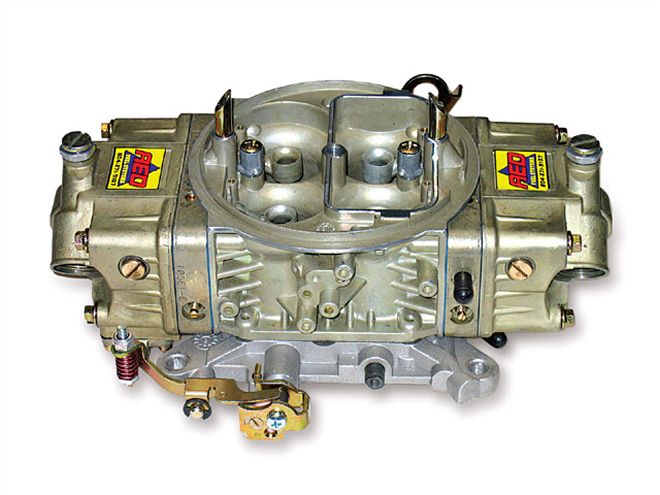
AED Performance
With almost 30 years of experience building carburetors, AED has it down. Like other custom shops, they can build you just about any size carburetor to run E85. Their E85 carbs use cast metering blocks because they prefer their sealing characteristics to the billet units for these carburetors specifically.
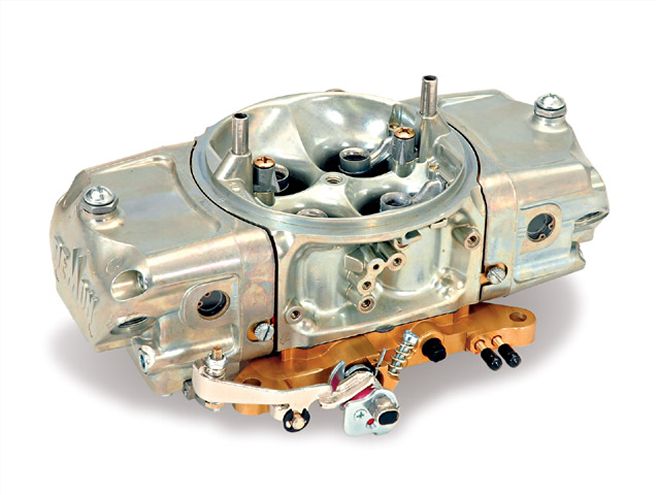
Barry Grant
Currently, Barry Grant has Mighty Demon E85 carburetors for general competition, and drag-race specific versions in 650, 750, 825, and 850 cfm. They will be adding their line of King Demons to the E85 product list late this summer.
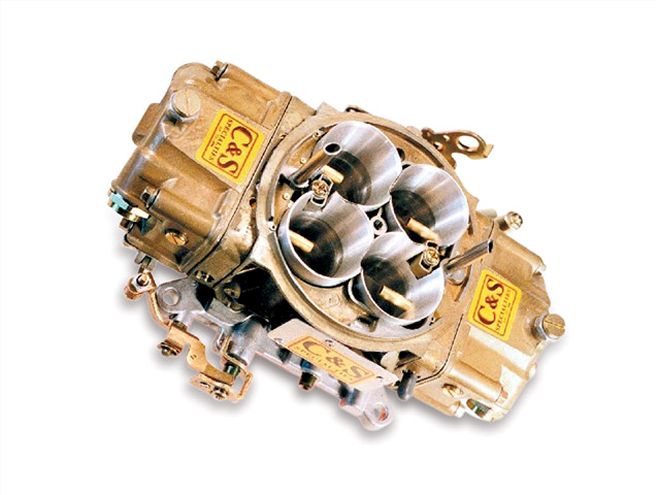
C&S Specialties
C&S builds every carburetor tailored to a particular engine. Among the factors they consider are engine size, compression, purpose, altitude, and of course, fuel type. C&S builds their E85 carburetors to flow the additional 30 percent over gasoline, and they install stainless steel needles and seats. C&S doesn't charge a different price for E85.
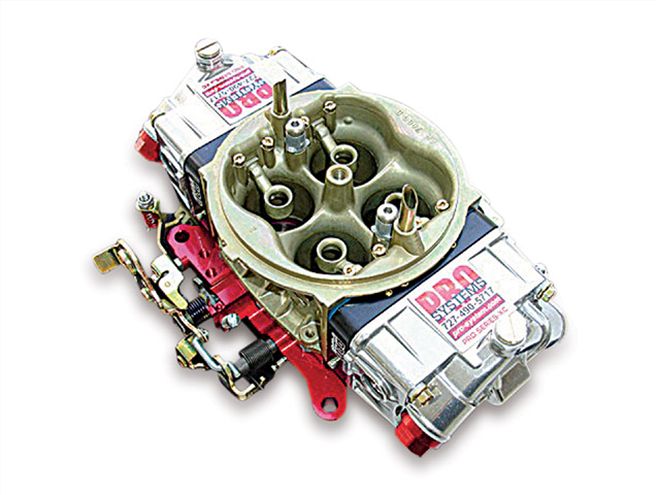
Pro Systems
As a custom builder, Pro Systems can make just about any carburetor you want. They build 4150-style units from 750-1040 cfm, and 4500s from 900-1800 cfm.
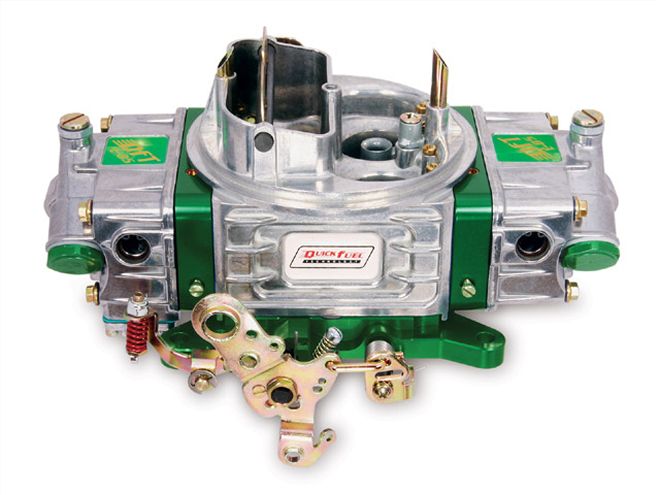
Quick Fuel Technologies
Quick Fuel Technologies offers 4150-style E85 carburetors in 650-1050 cfm ratings. They've built E85-specific billet metering blocks and base plate to get the most power out of the alcohol/gasoline mix.
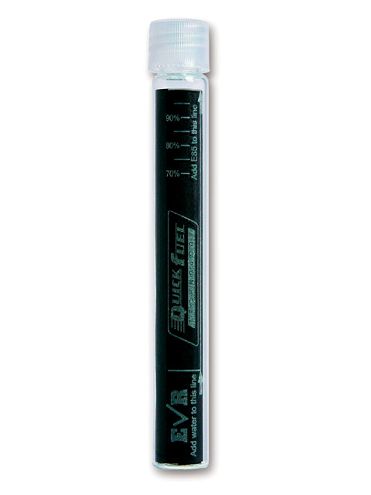
E85 Test Kit
If you're stuck at the pump and need to be able to tune your car optimally, you will need to test its actual ethanol content. Quick Fuel Technologies (QFT) produces a testing kit that can help you know what to expect when you run it. The testing process is simple. There are two fill lines on the test tube. You fill to the first line with water, and the second with the E85 in question. The next step is to shake the tube, set it upright and let it rest for a minute. The gasoline will separate from the water and alcohol to show what percent it is. The QFT part number is 36-E85, and the kit retails for $14.99.
Fuel Pumps
Selecting a fuel pump to run your E85 powerplant is pretty simple. The issues with the alcohol-based fuels have already been addressed for racers using methanol race fuel. Since both methanol and ethanol expose the fuel system to water, unlike gasoline, the pumps need to be able to endure the water's corrosiveness. The other compensation to make is for the increased flow needed for the lower air/fuel mixture. Fuel pumps built for methanol already outflow those made for gasoline. With these things accommodated for, any fuel pump that is compatible with methanol will also work for E85.
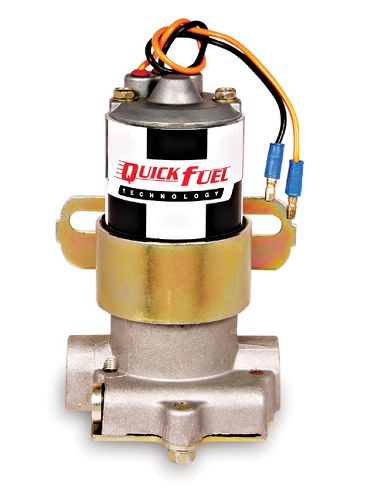
Quick Fuel Technologies
Quick Fuel Technologies offers 4150-style E85 carburetors in 650-1050 cfm ratings. They've built E85-specific billet metering blocks and base plate to get the most power out of the alcohol/gasoline mix.
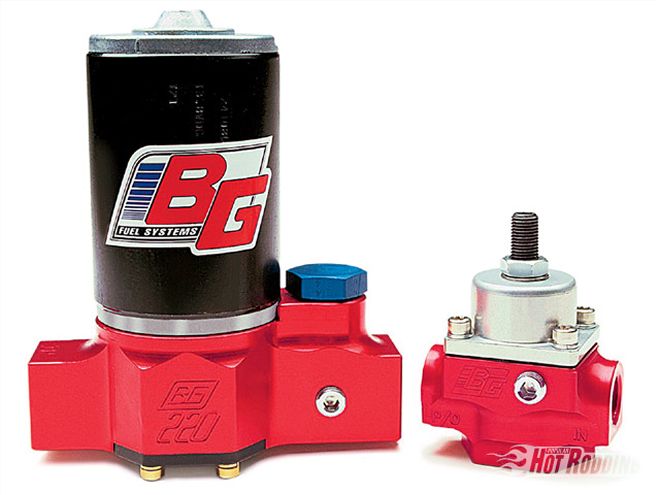
Barry Grant
All of the BG pumps are compatible with E85, but they have two models they highly recommend for up to 650 hp. One is their street pump, which comes with a regulator, and the other is their drag-race only version that has a higher flow rating, but doesn't feature an option for a return line, so street use is discouraged.
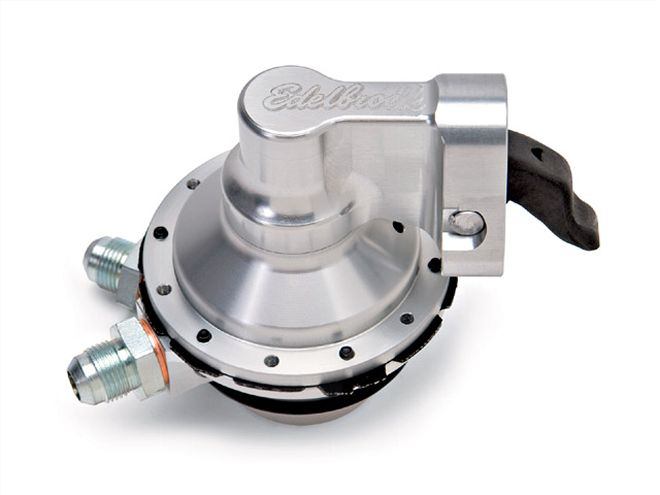
Edelbrock
As the only mechanical pump in the E85 lineup, Edelbrock comes through with their Victor Series Billet Aluminum pump. They are available for a small- and big-block Chevy, small-block Ford, and small-block Chrysler.
Fuel Lines
All of the manufacturers recommended that their fuel pumps be gravity fed, and put a huge emphasis on the importance of large enough lines. For street and light racing use they recommend a -10 line (about 1/2-inch ID) from the tank to the filter and pump assembly, then from the pump to the regulator. Depending on the pump and application, a -8 or larger return line may be needed. Each system is different, so asking your pump manufacturer for specifics is recommended. As a general rule, use high-quality AN fittings with a consistent inside diameter throughout.
We've got some very mixed feedback about which specific lines are compatible with E85. The carburetor manufacturers all told us that any quality steel braided or similar lines have shown no problems running alcohol through them. On the other hand, the manufacturers of the lines themselves were hesitant to put their stamp of approval on it, despite the overwhelming positive feedback. Newer cars are using neoprene or coated metal hard lines for most of their E85 plumbing. Metal lines that don't have an internal coating can be an issue.
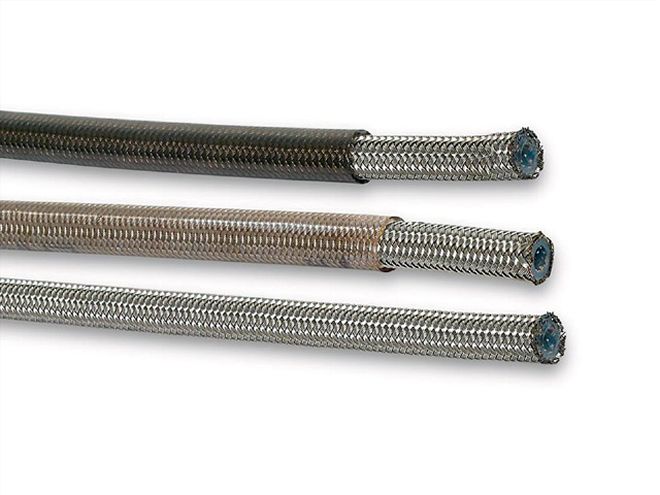
Earl's
We've seen Earl's product all over race cars, and for good reason. They have an extensive line of hoses, fittings, and adapters to complete your fuel system. They recommend using their Speed-Flex hose for E85. It's got an extruded Teflon liner with a stainless steel outer braid. It comes in AN sizes -3 through -8, and is even resistant to brake fluid.
Filters
Since alcohol-based fuels tend to carry more water than gasoline, the filters can't be water-soluble. Paper is more sensitive to exposure to water than other materials, so they should be avoided unless the manufacturer states it is alcohol friendly. Most of the top-shelf filters use a metal or plastic screen to catch debris. Another issue with the filters can be the O-ring style fittings. Some O-rings not designed to work with alcohol will dry out.
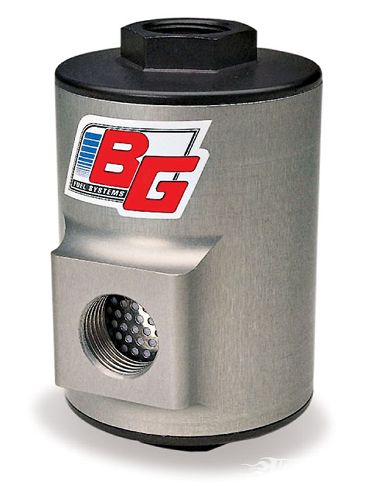
Barry Grant
If you've chosen BG's 170013 or 17002 pumps, you can easily attach their E85-safe fuel filter with a simple adapter.
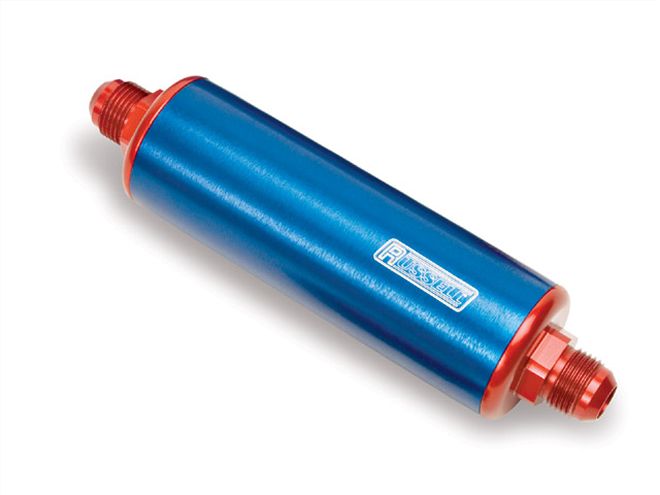
Russell
Russell, and Edelbrock, their parent company, carry several fuel filters. All of their filters are E85 compliant with the exception of their Aluminum Street Series. The filters below come in red, black, or blue anodized, or polished aluminum housings. They are serviceable, and Russell sells replacement filter elements.